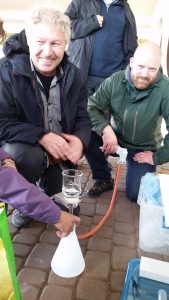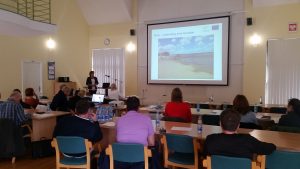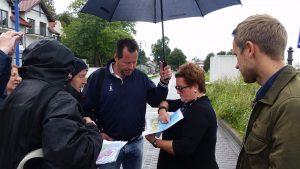On the 14th and 15th of September 2017 the project kick-off meeting of LiveLagoons was held in Gdansk, Poland. The aim of the Interreg South Baltic project is to improve the water quality in eutrophicated lagoons by the use of innovative floating wetlands for nutrient removal.
Rain showers did not prevent the project partners from Lithuania, Poland and Germany to carry out their first site excursion to the Bay of Puck. After an introduction and a walking tour with the major Hanna Pruchniewska, the LiveLagoons crew started taking first samples during following the boat trip for water quality analyses. In spring 2018 the first “green islands” will be installed in Puck Bay. Emergent macrophytes such as sedges, reed or rushes are planted on floating mats and contribute in many ways to improving the quality of the water. The macrophyte islands are able to adsorb and remove nutrients from the water, attenuate waves and water flow, hence promote sedimentation and sediment stability, create diverse habitats for microbes, birds and insects and offer and can be an aesthetic “eye-catcher” for residents and tourists in coastal regions.
The LiveLagoons project, which runs until summer 2020, is coordinated by the University of Klaipeda (Lithuania). Other project partners are EUCC – The Coastal Union Germany e.V., IBW PAN Institute Of Hydroengineering of the Polish Academy Of Sciences, the Municipality of Puck and the National Park Office of the Curonian Spit. The next project meeting will take place in Nida at the end of May 2018, where associated project partners such as the environment agencies or interested coastal communities are invited to explore two different types of floating macrophyte islands on site.




